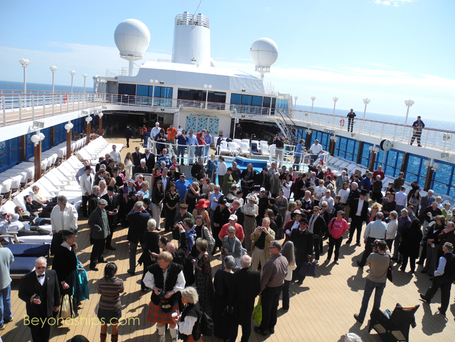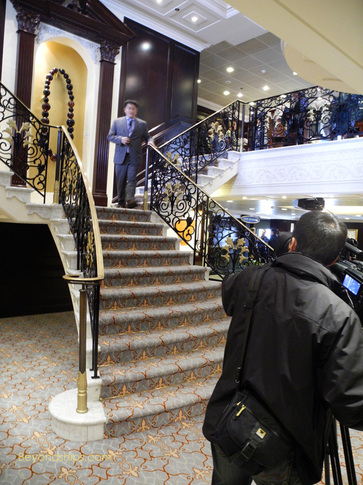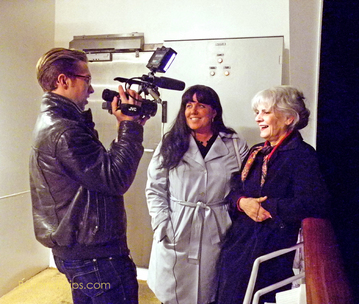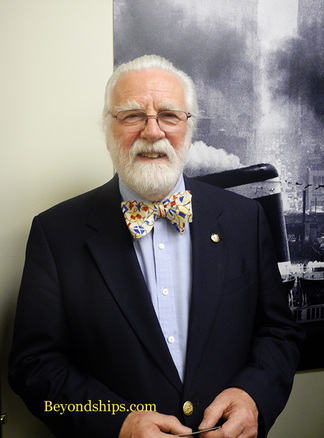|
Some of the passengers on Azamara Journey assembling for a group photo.
|
|
Two questions that intrigued me from the moment that I heard of the Titanic Anniversary Cruise were who would go on such a cruise and why would they go?
The majority of the passengers on the Titanic Anniversary cruise were from the United States and Canada. They included a substantial number who had traveled across the continent to New York to join the ship from places such as British Columbia, Texas and California. However, the distances that those people had traveled paled in comparison to the people who had journeyed from Australia just for this voyage. Similarly, although many of the passengers on the Balmoral were from the United Kingdom, there were guests from across Europe, Asia and Australia. People of all ages were attracted to the cruises. "One of the most surprising things about this trip was the number of young people onboard who are enchanted with the whole thing," commented author and historian Commodore Ronald Warwick who was a featured speaker on the Balmoral. "A lot of these young people have read about it or seen the film and now they are really interested. Of course, the James Cameron film was a love story but it did a good service to the memory of these people because it made them interested. A lot of them said that they saw the film and went off and bought books about it and researched it." On Azamara Journey, there was a young boy who spent much of the cruise in various period costumes. There were also people in their eighties. The bulk of the passengers, however, were middle-aged adults with women seemingly outnumbering men. The passengers came from all walks of life. I met a surgeon, a fireman, clergymen, attorneys, nurses and people involved with information technology. There were retired people and people just out of school soon to start their careers. Quite a few people had developed an expertise in Titanic or in some aspect of the disaster. Many said that they had had a life-long interest in the subject and had studied the topic for a long time. Others confessed to a lesser interest in Titanic but said that they had come because it sounded like an interesting vacation. Still others said that they had come because they are fans of Azamara Journey. Perhaps surprisingly, many of the passengers who said that they had a passionate interest in Titanic had never been on a cruise before. For some, that was because their interest was specific to Titanic, not ocean travel in general. For others, it was because their jobs or their finances had not allowed them to cruise before. However, the opportunity to be at the Titanic site on the anniversary of the disaster created a compelling incentive to go to sea. As one passenger observed about his fellow Titanic enthusiasts: "When we heard about this cruise, we just had to be here." People traveling on a cruise are generally more open and friendly than people traveling on land. But since nearly everyone on this cruise shared an interest in Titanic, it was particularly easy for people to get to know one another and make friends. Whenever you encountered a stranger, there was always a topic of conversation about a mutual interest right at hand. This was particularly fortunate as some 20 percent of the passengers were traveling by themselves. Another sizeable contingent of travelers was the press. Such major media outlets as CNN and ITN had representatives onboard Azamara Journey. They were joined by television crews from Germany and Russia as well as radio station and newspaper reporters, freelancers and bloggers. When the ship was in New York and in Halifax even more members of the media came aboard. In keeping with the guidelines which Miles Morgan Travel repeatedly distributed, the media were generally not intrusive. Occasionally, you would see a television crew videoing a segment, a reporter interviewing a passenger or a photographer taking still images. They became part of the entertainment - - something unusual to watch. Furthermore, their presence meant that this was indeed a newsworthy event, which in turn made the passengers feel that they were participating in something special. |
Above: Commodore Ronald Warwick.
But what is it about the Titanic disaster that creates such an interest in the subject? Clearly, it is more than the fact that the Titanic served as the setting for an extremely popular movie. As Commodore Warwick noted, the 1997 film served to introduce some people to the story but widespread interest in Titanic existed prior to the film and continued after the mania over the film had subsided. What is it about Titanic that people find so compelling?
It is also more than the fact that the sinking of the Titanic was a major maritime disaster. To illustrate, relatively few people beyond maritime historians have more than a passing knowledge of the sinking of Titanic's great rival, the Lusitania, just three years later. Titanic was built in order to compete with Lusitania and that ship was as well-known and as popular as Titanic in her day. She carried a similar mix of A-list celebrities and everyday people. Her sinking with great loss of life led to America's entry into World War I and thus changed the course of world history. Yet, today, it is dismissed by many as simply the type of tragedy that is to be expected in times of war. Speaking with the people on the Titanic Anniversary Cruise, the common thread that emerged was a fascination with the multi-faceted human drama that makes up the Titanic story. On a broad level, it is a story of a loss of innocence. In 1912, there was a general view that civilization had progressed to the point where many of the problems that had plagued earlier generations had been or shortly would be overcome. Technology was transforming people's lives. Titanic, a ship that the popular press said was unsinkable, symbolized this technological progress. A wandering iceberg, formed from snow that fell thousands of years before, shattered this naïve and arrogant belief. "There is nothing significant about Titanic per se," maritime historian John Langley commented. "She had one of the shortest histories in ocean liner history, which makes her insignificant in many ways as a performer. But it is what she represented that is significant, I think, in terms of the Edwardian Age and the realization that man was not omnipotent and couldn't control the forces of nature. It brought us to a halt. I think that makes Titanic important, not the ship, the steel, the rivets." Like a well-written drama, there are countless points in the Titanic story where a different decision would have radically altered events. For example, if only the captain had heeded the ice warnings received from other ships and had changed course, the collision would not have occurred. If only the officer on the bridge had not tried to turn Titanic in order to avoid hitting the iceberg because hitting the berg head on would not have caused fatal damage to the ship. If only the nearby ship, the Californian, had responded to Titanic's distress calls, there would not have been such a great loss of life - - the list goes on and on. Thus, Titanic is not just a story about a failure of technology but of human fallibility. At the same time, the Titanic story includes episodes of courage, sacrifice and devotion. Unlike the Lusitania which sank in 18 minutes, it took several hours for Titanic to sink and so there was time for such episodes to unfold. Furthermore, although the majority of those onboard perished, there were a substantial number of survivors who were able to tell of these acts. As a result, there is much in the Titanic story that people can relate to on an intimate level. Finally, the Titanic has an ongoing legacy that impacts people today. Commodore Warwick, who as the first Master of Queen Mary 2 and as captain of Queen Elizabeth 2 did many transatlantic crossings, pointed out: "To me, it is all about acknowledging that the people who died did not do so in vain. As a seafarer, I benefited, as did the passengers we carried, from the safety measures that were introduced [because of Titanic] - - the introduction of the International Ice Patrol; 24-hour radio watch, enough lifeboats [for all onboard]. That's what Titanic has always been about. I think we owe it to those who died to perpetuate their memory." Along the same lines, maritime historian Bill Miller noted the lessons of Titanic are not written in the past tense. "It can happen again, not necessarily with icebergs - - we just had the Costa Concordia. It reminds us that accidents, disaster, even tragedy can occur again." |
|
|
|
Cruise ship article - - Titanic - - Titanic 100th Anniversary Cruise - Part II - Who and Why



